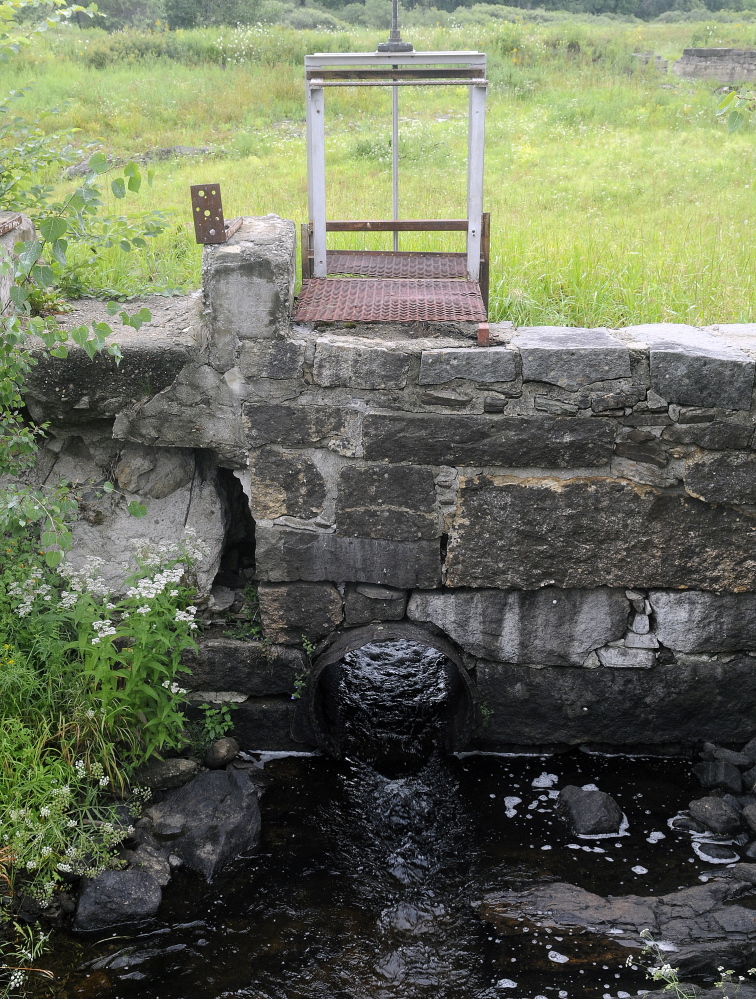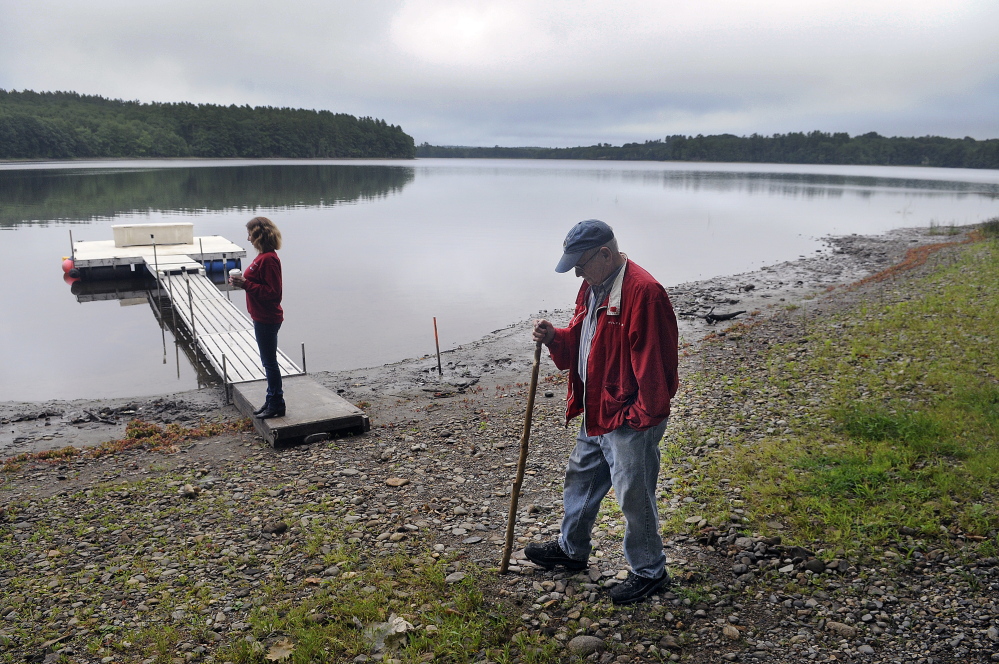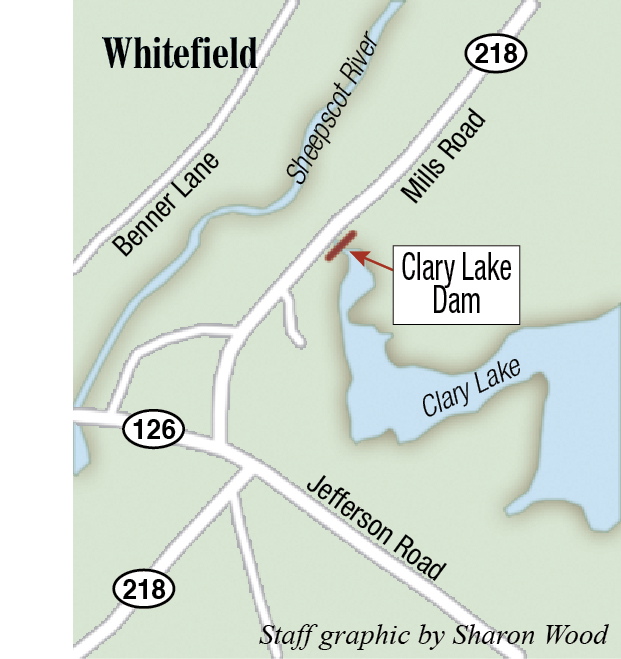Lakeside landowners blame dam owner who contends state Department of Environmental Protection is at fault
JEFFERSON — Jane Roy said dozens of family members used to enjoy visiting her father’s camp on Clary Lake in the summer, spending time boating or fishing on the lake or swimming off the dock.
But for the last four years, as the result of an ongoing dispute between a dam owner, the state and waterfront land owners in Jefferson and Whitefield, the camp her father built in 1958 has been largely missing something during the summer months: water.
There’s still water in the lake, but the level has dropped to a point that makes it unusable for many lakefront landowners and people who used to boat, fish or swim there.
Docks and water lines have been pushed farther from the shore into depths dwindling below a foot. Boats and kayaks have run aground. A boat ramp built by the state 12 years ago is no longer touching the water. Vegetation is now growing on parts of shoreline where people previously swam.
Roy’s father, Stan Whittier, said his neighbors even had to mow their beach recently.
“I’ve been here since ’58, and this is the worst it’s ever been,” Whittier said.
The lake’s water level, which was about 5.5 feet below the top of the dam last week, is the lowest he’s seen it besides possibly the summer of 1961, when a previous dam owner lowered the water level to make repairs, he said.
The low water level has also harmed hundreds of acres of wetlands, including around 40 acres of freshwater emergent wetlands, which are highly valued by the state for providing habitat to waterfowl and other wildlife. About 3 percent of wetlands in the state are considered emergent, making the loss of wetlands the primary concern at Clary Lake, said Keel Kemper, a wildlife biologist with the Maine Department of Inland Fisheries and Wildlife.
The wetlands are located in the lake’s northwestern end, where a small channel weaves through the wetlands to the dam that impounds the more-than-650-acre lake. Currently, the wetlands more resemble a squishy field with a small stream through it than a marshy land providing habitat for ducks and other wildlife.
Without a higher and stable water level, the wetlands at Clary Lake will continue to suffer, Kemper said.
Although problems between owners of the dam along Route 218 and landowners on the lake go back decades, those involved say the issue worsened about four years ago. Shortly after, more than 100 property owners near the lake filed their petition with the Maine Department of Environmental Protection asking the department to set a water management plan for the lake.
After a two-year-long process punctuated by multiple deadline extensions and lengthy legal briefs, the department issued its order in January 2014 outlining how the owner, Pleasant Pond Mill LLC, must operate the dam. The order also required the owner to make repairs to the more-than-100-year-old dam by October 2014.
Repairs were never made and the dam’s gate has mostly remained opened. The dam’s owner appealed the water level order to Lincoln County Superior Court and requested the parties enter mediation. The mediation ended earlier this year without a resolution. The case is still in court, and most recently, the attorneys representing the department filed a motion to dismiss the claims made by the dam owner.
Malcolm Burson, president of the Clary Lake Association, said he and the association don’t blame the department for the situation, but they “hope that the crisis this year will lead them to take some action.”
Roy, whose father has owned property on the lake for nearly six decades, recently wrote an email to the department asking why the department has yet to enforce the water order.
Besides requiring repairs by last October, the order requires the dam owner to keep the water level no more than two feet below the lake’s historical normal high water, determined by the state to be near the top of the dam.
Roy, who lives in Casco, lays the blame for the low water level on Paul Kelley, the owner of Pleasant Pond Mill. She said she can’t stand seeing the lake so low as a result of what she said is one man’s action, or inaction.
“I just feel like we’re on the right side of it,” Roy said. “We just want what’s right for the environment and family life here. That’s it. We take care of this lake.”
But Kelley, whose company bought the dam in 2004 as part of a plan to renovate an old mill building on the other side of the street for a mixed-use development, said the department should have never accepted the water level petition. He said the company was preparing to make repairs to the hole in the dam caused by Tropical Storm Irene in August 2011 when the state started the lengthy procedure.
Kelley blames the department for beginning the process, which was the first ever undertaken by the department, instead of finding a more cooperative solution to the problem.
Earlier this year, the department submitted a bill to the Legislature with proposed changes to the water level management plan process, including requiring mediation before the department undertakes an adjudicatory hearing and requiring petitions to cover the cost of the hearing. Those changes weren’t included in the final bill that became law, and instead the Legislature put a moratorium on new water level processes or orders until October 2016.
“My company wonders why, if the state has simply lost confidence in the water level law, we haven’t now moved on to some more creative solution problem solving,” Kelley said.
He dissolved the company in March because he said he’s unable to obtain insurance for the dam because Whitefield didn’t join the federal flood insurance program. If the state ever attempts to enforce the water level order, Kelley said the outcome will be the state ending up taking over ownership of the dam.
“My company thinks it’s unreasonable that a private business be required to provide a public benefit at its own cost when it cannot insure against any associated risks,” he said. “The state is asking that my company knowingly flood upstream and downstream properties, and that’s not a workable solution.”
The spokesman for the Maine Department of Environmental Protection, David Madore, declined to answer any questions about why the department sought changes to the water level plan law or why it hasn’t enforced the water level order on Clary Lake, citing the ongoing litigation.
Paul Koenig — 621-5663
Twitter: @pdkoenig
Send questions/comments to the editors.





Success. Please wait for the page to reload. If the page does not reload within 5 seconds, please refresh the page.
Enter your email and password to access comments.
Hi, to comment on stories you must . This profile is in addition to your subscription and website login.
Already have a commenting profile? .
Invalid username/password.
Please check your email to confirm and complete your registration.
Only subscribers are eligible to post comments. Please subscribe or login first for digital access. Here’s why.
Use the form below to reset your password. When you've submitted your account email, we will send an email with a reset code.